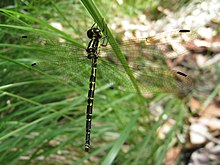Choristhemis flavoterminata, the yellow-tipped tigertail, is a species of dragonfly from the family Synthemistidae found in New South Wales and Queensland, Australia.[4][5] Yellow-tipped tigertails inhabit streams and rivers and can be found amongst mud and gravel.[6]
| Yellow-tipped tigertail | |
|---|---|

| |
| Female | |

| |
| Male | |
| Scientific classification | |
| Domain: | Eukaryota |
| Kingdom: | Animalia |
| Phylum: | Arthropoda |
| Class: | Insecta |
| Order: | Odonata |
| Infraorder: | Anisoptera |
| Family: | Synthemistidae |
| Genus: | Choristhemis |
| Species: | C. flavoterminata
|
| Binomial name | |
| Choristhemis flavoterminata | |

| |
| Synonyms[3] | |
| |
Early life
editAt hatching, yellow-tipped tigertail larvae are about 7.5 mm long, and measure 4.1 mm from each side of the head. The abdomen consists of a small quantity of hair, measures 12.1 mm, and is relatively thin. They are light gray or brown in color, later maturing into a deeper shade of that specific color.[7] Larvae burrow into the mud for protection,[7] but they are endangered by underwater predators capable of digging through the mud burrows from the main body of water, and eating the larvae. Once mature, yellow-tipped tigertail larvae become predators, feeding on smaller bugs.[7]
Body
editThe average yellow-tipped tigertail has a body length around 47 mm. Its body is long, ending with a bright yellow spot, and its abdomen is thin. Its wings have a slight brown tint and a dark brown rectangular spot.[8] Yellow-tipped tigertails are believed to fake death when frightened by folding their legs across their bodies until they no longer feel threatened, at which point they fly away. They do so most commonly when they are lying on their dorsal or ventral surfaces.[9]
Gallery
edit-
Male
-
Wings
-
Side view
-
Male tail
-
Male
-
Male, viewed from under
-
Mating, male is on top
-
Female is ovipositing, laying her eggs in a shallow stream
-
Female wings
-
Male wings
See also
editReferences
edit- ^ Dow, R.A. (2017). "Choristhemis flavoterminata". IUCN Red List of Threatened Species. 2017: e.T87538487A87540154. doi:10.2305/IUCN.UK.2017-1.RLTS.T87538487A87540154.en. Retrieved 13 September 2024.
- ^ Martin, R. (1901). "Les odonates du continent australien". Mémoires de la Société Zoologique de France. 14: 220–248 [229] – via Biodiversity Heritage Library.
- ^ Paulson, D.; Schorr, M.; Abbott, J.; Bota-Sierra, C.; Deliry, C.; Dijkstra, K.-D.; Lozano, F. (2024). "World Odonata List". OdonataCentral, University of Alabama.
- ^ "Species Choristhemis flavoterminata (Martin, 1901)". Australian Faunal Directory. Australian Biological Resources Study. 2022. Retrieved 27 August 2024.
- ^ "Choristhemis flavoterminata". Global Biodiversity Information Facility. Retrieved 11 December 2009.
- ^ Theischinger, Günther; Hawking, John (2021). The Complete Field Guide to Dragonflies of Australia (2nd ed.). Melbourne, Australia: CSIRO Publishing. p. 406. ISBN 9781486313747.
- ^ a b c Tillyard. "The larva of Choristhemis (TILLYARD)" (PDF). Austria: Biologiezentrum Linz. Retrieved 11 December 2009.
- ^ "Brisbane Insects- Choristhemis flavoterminata". Australia: Brisbane Insects. Retrieved 11 December 2009.
- ^ Paulson, Dennis; Gutierrez, Rodolfo Novelo (16 February 1999). "Death feigning in dragonflies?". University of Puget Sound. Tacoma, WA. Archived from the original on 20 July 2011. Retrieved 15 December 2009.
